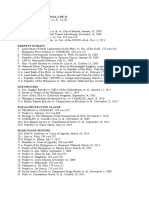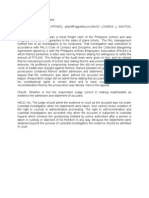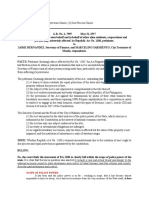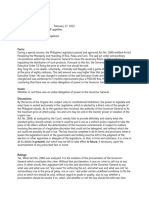0 ratings0% found this document useful (0 votes)
145 viewsPP Vs Vera
PP Vs Vera
Uploaded by
RJ TurnoThe Supreme Court ruled that Section 11 of Act No. 4221, which granted provincial boards the power to determine whether the probation law would apply in their provinces, constituted an improper delegation of legislative authority and violated the constitutional principle of equal protection under the law. By giving provincial boards absolute discretion without standards, the law allowed for arbitrary decisions and the potential for unequal treatment of individuals in different provinces. The Court concluded Section 11 was therefore unconstitutional and void.
Copyright:
© All Rights Reserved
Available Formats
Download as DOCX, PDF, TXT or read online from Scribd
PP Vs Vera
PP Vs Vera
Uploaded by
RJ Turno0 ratings0% found this document useful (0 votes)
145 views2 pagesThe Supreme Court ruled that Section 11 of Act No. 4221, which granted provincial boards the power to determine whether the probation law would apply in their provinces, constituted an improper delegation of legislative authority and violated the constitutional principle of equal protection under the law. By giving provincial boards absolute discretion without standards, the law allowed for arbitrary decisions and the potential for unequal treatment of individuals in different provinces. The Court concluded Section 11 was therefore unconstitutional and void.
Original Description:
Case digest of pp vs vera
Original Title
pp vs vera
Copyright
© © All Rights Reserved
Available Formats
DOCX, PDF, TXT or read online from Scribd
Share this document
Did you find this document useful?
Is this content inappropriate?
The Supreme Court ruled that Section 11 of Act No. 4221, which granted provincial boards the power to determine whether the probation law would apply in their provinces, constituted an improper delegation of legislative authority and violated the constitutional principle of equal protection under the law. By giving provincial boards absolute discretion without standards, the law allowed for arbitrary decisions and the potential for unequal treatment of individuals in different provinces. The Court concluded Section 11 was therefore unconstitutional and void.
Copyright:
© All Rights Reserved
Available Formats
Download as DOCX, PDF, TXT or read online from Scribd
Download as docx, pdf, or txt
0 ratings0% found this document useful (0 votes)
145 views2 pagesPP Vs Vera
PP Vs Vera
Uploaded by
RJ TurnoThe Supreme Court ruled that Section 11 of Act No. 4221, which granted provincial boards the power to determine whether the probation law would apply in their provinces, constituted an improper delegation of legislative authority and violated the constitutional principle of equal protection under the law. By giving provincial boards absolute discretion without standards, the law allowed for arbitrary decisions and the potential for unequal treatment of individuals in different provinces. The Court concluded Section 11 was therefore unconstitutional and void.
Copyright:
© All Rights Reserved
Available Formats
Download as DOCX, PDF, TXT or read online from Scribd
Download as docx, pdf, or txt
You are on page 1of 2
PEOPLE VS VERA
G.R. No. L-45685 65 Phil 56 November 16, 1937
THE PEOPLE OF THE PHILIPPINE ISLANDS and HONGKONG & SHANGHAI BANKING
CORPORATION, petitioners,
vs.
JOSE O. VERA, Judge . of the Court of First Instance of Manila, and MARIANO CU UNJIENG,
respondents.
Facts:
Mariano Cu Unjieng was convicted by the trial court in Manila. He filed for reconsideration and four
motions for new trial but all were denied. He then elevated to the Supreme Court and the Supreme
Court remanded the appeal to the lower court for a new trial. While awaiting new trial, he appealed
for probation alleging that the he is innocent of the crime he was convicted of. The Judge of the
Manila CFI directed the appeal to the Insular Probation Office. The IPO denied the application.
However, Judge Vera upon another request by petitioner allowed the petition to be set for hearing.
The City Prosecutor countered alleging that Vera has no power to place Cu Unjieng under probation
because it is in violation of Sec. 11 Act No. 4221 which provides that the act of Legislature granting
provincial boards the power to provide a system of probation to convicted person. Nowhere in the
law is stated that the law is applicable to a city like Manila because it is only indicated therein that
only provinces are covered. And even if Manila is covered by the law it is unconstitutional because
Sec 1 Art 3 of the Constitution provides equal protection of laws. The said law provides absolute
discretion to provincial boards and this also constitutes undue delegation of power. Further, the said
probation law may be an encroachment of the power of the executive to provide pardon because
providing probation, in effect, is granting freedom, as in pardon.
Issues:
Whether or not Act No. 4221 constituted an undue delegation of legislative power
Whether or not the said act denies the equal protection of the laws
Discussions:
An act of the legislature is incomplete and hence invalid if it does not lay down any rule or definite
standard by which the administrative officer or board may be guided in the exercise of the
discretionary powers delegated to it. The probation Act does not, by the force of any of its
provisions, fix and impose upon the provincial boards any standard or guide in the exercise of their
discretionary power. What is granted, as mentioned by Justice Cardozo in the recent case of
Schecter, supra, is a “roving commission” which enables the provincial boards to exercise arbitrary
discretion. By section 11 if the Act, the legislature does not seemingly on its own authority extend
the benefits of the Probation Act to the provinces but in reality leaves the entire matter for the
various provincial boards to determine.
The equal protection of laws is a pledge of the protection of equal laws. The classification of equal
protection, to be reasonable, must be based on substantial distinctions which make real differences; it
must be germane to the purposes of the law; it must not be limited to existing conditions only, and
must apply equally to each member of the class.
Rulings:
The Court concludes that section 11 of Act No. 4221 constitutes an improper and unlawful
delegation of legislative authority to the provincial boards and is, for this reason, unconstitutional
and void. There is no set standard provided by Congress on how provincial boards must act in
carrying out a system of probation. The provincial boards are given absolute discretion which is
violative of the constitution and the doctrine of the non delegation of power. Further, it is a violation
of equity so protected by the constitution. The challenged section of Act No. 4221 in section 11
which reads as follows: This Act shall apply only in those provinces in which the respective provincial
boards have provided for the salary of a probation officer at rates not lower than those now provided
for provincial fiscals. Said probation officer shall be appointed by the Secretary of Justice and shall be
subject to the direction of the Probation Office.
The provincial boards of the various provinces are to determine for themselves, whether the
Probation Law shall apply to their provinces or not at all. The applicability and application of the
Probation Act are entirely placed in the hands of the provincial boards. If the provincial board does
not wish to have the Act applied in its province, all that it has to do is to decline to appropriate the
needed amount for the salary of a probation officer.
It is also contended that the Probation Act violates the provisions of our Bill of Rights which prohibits
the denial to any person of the equal protection of the laws. The resultant inequality may be said to
flow from the unwarranted delegation of legislative power, although perhaps this is not necessarily
the result in every case. Adopting the example given by one of the counsel for the petitioners in the
course of his oral argument, one province may appropriate the necessary fund to defray the salary of
a probation officer, while another province may refuse or fail to do so. In such a case, the Probation
Act would be in operation in the former province but not in the latter. This means that a person
otherwise coming within the purview of the law would be liable to enjoy the benefits of probation in
one province while another person similarly situated in another province would be denied those same
benefits. This is obnoxious discrimination. Contrariwise, it is also possible for all the provincial boards
to appropriate the necessary funds for the salaries of the probation officers in their respective
provinces, in which case no inequality would result for the obvious reason that probation would be in
operation in each and every province by the affirmative action of appropriation by all the provincial
boards.
You might also like
- Constitutional Law Cases 2nd BatchDocument42 pagesConstitutional Law Cases 2nd Batchcharmssatell100% (1)
- Consti DigestDocument6 pagesConsti DigestYannah SJNo ratings yet
- Garcia vs. Drilon Case DigestDocument2 pagesGarcia vs. Drilon Case DigestGilbert John LacorteNo ratings yet
- People v. Lodrigo Bayya, G.R. No. 127845, March 10, 2000Document7 pagesPeople v. Lodrigo Bayya, G.R. No. 127845, March 10, 2000Shiela BrownNo ratings yet
- Brillantes, Jr. vs. Yorac G.R. No. 93867 December 18, 1990Document50 pagesBrillantes, Jr. vs. Yorac G.R. No. 93867 December 18, 1990PRINCE LLOYD D.. DEPALUBOSNo ratings yet
- Webb vs. de LeonDocument2 pagesWebb vs. de LeonJan Mar Gigi GallegoNo ratings yet
- 143 Legaspi vs. CSCDocument2 pages143 Legaspi vs. CSCDondi de MesaNo ratings yet
- Compiled Consti ReportDocument16 pagesCompiled Consti ReportJohn Henry CasugaNo ratings yet
- Consti2Digest - Phils Vs Hidalgo, A.M. No. RTJ-05-1959Document1 pageConsti2Digest - Phils Vs Hidalgo, A.M. No. RTJ-05-1959Lu CasNo ratings yet
- Estrada vs. Ombudsman, Sandiganbayan Et - Al.Document26 pagesEstrada vs. Ombudsman, Sandiganbayan Et - Al.stefocsalev17No ratings yet
- Primicias Vs FugosoDocument3 pagesPrimicias Vs FugosoArvy AgustinNo ratings yet
- Almeda vs. Villaluz (GR L-31665, 6 August 1975)Document3 pagesAlmeda vs. Villaluz (GR L-31665, 6 August 1975)Joycee ArmilloNo ratings yet
- Constitutional Law II Case Digests2Document30 pagesConstitutional Law II Case Digests2Hansel Jake B. PampiloNo ratings yet
- Ople vs. TorresDocument2 pagesOple vs. TorresJovelan V. EscañoNo ratings yet
- Ang Ladlad vs. Comelec, 618 Scra 32Document66 pagesAng Ladlad vs. Comelec, 618 Scra 32Evangeline Antonio-TorresNo ratings yet
- Verdadero Vs PeopleDocument5 pagesVerdadero Vs Peopleeunice demaclidNo ratings yet
- Air Transportation Office Vs SpsDocument2 pagesAir Transportation Office Vs Spsinsert nameNo ratings yet
- Ondoy v. IgnacioDocument2 pagesOndoy v. IgnacioKim LaguardiaNo ratings yet
- Republic v. Lim, GR 161656, 2005Document15 pagesRepublic v. Lim, GR 161656, 2005Christia Sandee Suan100% (1)
- Principle and State Policies Case DigestDocument22 pagesPrinciple and State Policies Case DigestJobelle Villareal-GuevarraNo ratings yet
- Cases in Contitutional Law Ii. 2017Document4 pagesCases in Contitutional Law Ii. 2017MR. LemmingNo ratings yet
- Estrada vs. OmbudsmanDocument121 pagesEstrada vs. OmbudsmanLegaspiCabatchaNo ratings yet
- Consti Digest Week 5Document5 pagesConsti Digest Week 5Nathan AlasaNo ratings yet
- Statcon SyllabusDocument3 pagesStatcon SyllabusKrizzaShayneRamosArqueroNo ratings yet
- Consti 2 Digest 132 Govt of Usa Vs Judge PurgananDocument13 pagesConsti 2 Digest 132 Govt of Usa Vs Judge PurgananRed HoodNo ratings yet
- 1 - People Vs HernandezDocument1 page1 - People Vs Hernandezmcris101100% (2)
- Consti 2 (Part 3) CasesDocument12 pagesConsti 2 (Part 3) CasesJames Glendon PialagoNo ratings yet
- Sangalang vs. IACDocument1 pageSangalang vs. IACAnge DinoNo ratings yet
- Shauf Vs CA, 191 SCRA 713 (1970)Document1 pageShauf Vs CA, 191 SCRA 713 (1970)geni_pearlcNo ratings yet
- de La Llana Vs Alba ComelecDocument17 pagesde La Llana Vs Alba ComelecJan Igor GalinatoNo ratings yet
- Dormal Vs SandigabayanDocument2 pagesDormal Vs SandigabayanCarlota Nicolas VillaromanNo ratings yet
- A03 S12 06 People vs. Loveria.Document1 pageA03 S12 06 People vs. Loveria.PaulRuizNo ratings yet
- Political Law - Inchong Vs HernandezDocument3 pagesPolitical Law - Inchong Vs HernandezJohn PudlaoNo ratings yet
- Churchill v. RaffertyDocument10 pagesChurchill v. RaffertyAnonymous gzsN1pQR100% (1)
- Bureau of Printing Vs Bureau of Printing Employees AssociationDocument2 pagesBureau of Printing Vs Bureau of Printing Employees AssociationHannesNo ratings yet
- Consti 1 Digests CompileDocument57 pagesConsti 1 Digests Compileleighds_shynie323100% (1)
- Guanzon vs. de VillaDocument1 pageGuanzon vs. de VillaJu LanNo ratings yet
- Digest 16. David vs. Arroyo, G.R. No. 171396Document1 pageDigest 16. David vs. Arroyo, G.R. No. 171396Inez Monika Carreon PadaoNo ratings yet
- March1 DigestsDocument14 pagesMarch1 DigestsShauna HerreraNo ratings yet
- People Vs RecepcionDocument1 pagePeople Vs RecepcionArvin HamorNo ratings yet
- J.B.L. Reyes v. BagatsingDocument14 pagesJ.B.L. Reyes v. BagatsingjeiromeNo ratings yet
- Garcia Vs Drilon - DigestDocument6 pagesGarcia Vs Drilon - DigestJoanna E100% (1)
- People Vs JalosjosDocument30 pagesPeople Vs JalosjosRyan MostarNo ratings yet
- Ichong Vs HernandezDocument2 pagesIchong Vs HernandezLylo BesaresNo ratings yet
- PP V JalosjosDocument2 pagesPP V JalosjosAlvin PateresNo ratings yet
- Okabe Vs Gutierez (C)Document1 pageOkabe Vs Gutierez (C)Justine Salcedo100% (1)
- Municipality of San Fernando, La Union vs. Judge Firme, 195 SCRA 692Document6 pagesMunicipality of San Fernando, La Union vs. Judge Firme, 195 SCRA 692Boy George100% (1)
- 40 Restituto Ynot Vs Intermediate Appellate CourtDocument5 pages40 Restituto Ynot Vs Intermediate Appellate CourtJan Igor GalinatoNo ratings yet
- 4 PP Vs GallardeDocument2 pages4 PP Vs GallardeJeah N MelocotonesNo ratings yet
- Municipality of Tangkal vs. Balindong (Digest)Document2 pagesMunicipality of Tangkal vs. Balindong (Digest)Rae100% (4)
- Accfa VS Cugco Case DigestDocument17 pagesAccfa VS Cugco Case DigestJey Rhy100% (1)
- Non ImpairmentDocument13 pagesNon ImpairmentRyan Jhay Yang100% (1)
- Group 4 Cases Llovit Part IDocument30 pagesGroup 4 Cases Llovit Part Iayhen01No ratings yet
- Trillanes vs. Pimentel Sr. (Case Digest)Document2 pagesTrillanes vs. Pimentel Sr. (Case Digest)Nixrabang100% (4)
- StatCon First 20 Cases DigestsDocument18 pagesStatCon First 20 Cases DigestsKei Grrr100% (1)
- S. Republic vs. Sandiganbaayan, GR No. 104768, July 21, 2003Document2 pagesS. Republic vs. Sandiganbaayan, GR No. 104768, July 21, 2003Allayza Claire MacoyNo ratings yet
- NatRes Digest - Wk3Document4 pagesNatRes Digest - Wk3RubyNo ratings yet
- People Vs VeraDocument3 pagesPeople Vs VeraFrancis Coronel Jr.No ratings yet
- People Vs Vera DIGESTDocument2 pagesPeople Vs Vera DIGESTGilly Mae Gallego RPh50% (2)
- People vs. VeraDocument2 pagesPeople vs. VeraLunag DonbelleNo ratings yet
- G.R. No. L-409 January 30, 1947ANASTACIO LAUREL, Eriberto Misa, ACTS!Document2 pagesG.R. No. L-409 January 30, 1947ANASTACIO LAUREL, Eriberto Misa, ACTS!RJ TurnoNo ratings yet
- Of The Winning Candidates For The Member of The House of Representatives, The Board of Canvassers of TheDocument9 pagesOf The Winning Candidates For The Member of The House of Representatives, The Board of Canvassers of TheRJ TurnoNo ratings yet
- GONZALES Vs COMELECDocument1 pageGONZALES Vs COMELECRJ TurnoNo ratings yet
- Lambino vs. Comelec Case Digest G.R. No. 174153lambino vs. Comelecg.R. No. 174153oct. 25 2006factsDocument1 pageLambino vs. Comelec Case Digest G.R. No. 174153lambino vs. Comelecg.R. No. 174153oct. 25 2006factsRJ TurnoNo ratings yet
- Laguna Lake Development Authority Vs CADocument1 pageLaguna Lake Development Authority Vs CARJ TurnoNo ratings yet
- Gamboa Vs TevesDocument1 pageGamboa Vs TevesRJ TurnoNo ratings yet
- Estrada V DesiertoDocument2 pagesEstrada V DesiertoRJ TurnoNo ratings yet
- Co Kim Cham vs. Valdez Tan KehDocument3 pagesCo Kim Cham vs. Valdez Tan KehRJ TurnoNo ratings yet
- KILUSANG MAYO UNO LABOR CENTER vs. GarciaDocument2 pagesKILUSANG MAYO UNO LABOR CENTER vs. GarciaRJ TurnoNo ratings yet
- En Banc in Re LetterDocument11 pagesEn Banc in Re LetterRJ TurnoNo ratings yet
- CIR V.S Campos RuedaDocument3 pagesCIR V.S Campos RuedaRJ TurnoNo ratings yet
- Francisco Vs House of RepresentativesDocument3 pagesFrancisco Vs House of RepresentativesRJ Turno100% (2)
- Macalintal vs. ComelecDocument1 pageMacalintal vs. ComelecRJ TurnoNo ratings yet
- Gerochi vs. DenrDocument2 pagesGerochi vs. DenrRJ TurnoNo ratings yet
- Us VS Ang Tang HoDocument2 pagesUs VS Ang Tang HoRJ Turno100% (3)
- Project PIL, ImportanceDocument54 pagesProject PIL, ImportanceZishan KhanNo ratings yet
- First Division: Respondents. The Solicitor General For Petitioner. Dominador Suñga For RespondentDocument8 pagesFirst Division: Respondents. The Solicitor General For Petitioner. Dominador Suñga For RespondentKristine BucuNo ratings yet
- Competency of A Witness, Competency of Accused, Accomplice, and SpouseDocument2 pagesCompetency of A Witness, Competency of Accused, Accomplice, and SpouseArpit AgarwalNo ratings yet
- United States v. Quattlebaum, 4th Cir. (2011)Document5 pagesUnited States v. Quattlebaum, 4th Cir. (2011)Scribd Government DocsNo ratings yet
- Rule 120 of The Revised Rules of Criminal ProcedureDocument4 pagesRule 120 of The Revised Rules of Criminal ProcedureRoveelaine Eve CastilloNo ratings yet
- KKK Foundation Vs BargasDocument2 pagesKKK Foundation Vs BargasEKANGNo ratings yet
- RA 9745 Anti Torture ActDocument15 pagesRA 9745 Anti Torture ActegaytfdpNo ratings yet
- English Legal System and Obligations PDFDocument343 pagesEnglish Legal System and Obligations PDFR Hayim BakaNo ratings yet
- 310Document16 pages310jdoe10010No ratings yet
- Judicial Review of Administrative Actions in Indian ContextDocument64 pagesJudicial Review of Administrative Actions in Indian ContextMayank Shekhar (B.A. LLB 16)No ratings yet
- NO Death PenaltyDocument1 pageNO Death PenaltykyleNo ratings yet
- Appellant's Brief Olmeda To Be ContinuedDocument4 pagesAppellant's Brief Olmeda To Be ContinuedTony LunasNo ratings yet
- Coggins v. State of Alabama Attorney General&apos S Office Et Al (MAG+) - Document No. 4Document3 pagesCoggins v. State of Alabama Attorney General&apos S Office Et Al (MAG+) - Document No. 4Justia.comNo ratings yet
- Com Res 10717 AnnexH8Document2 pagesCom Res 10717 AnnexH8Dimasirang TomasNo ratings yet
- Damages Awarded in An Oppression ActionDocument5 pagesDamages Awarded in An Oppression ActionNavin KumarNo ratings yet
- United States Court of Appeals, Third CircuitDocument31 pagesUnited States Court of Appeals, Third CircuitScribd Government DocsNo ratings yet
- Philippines and The Death PenaltyDocument5 pagesPhilippines and The Death PenaltyMary Grace BroquezaNo ratings yet
- Hackbart v. Cincinnati Bengals, IncDocument2 pagesHackbart v. Cincinnati Bengals, IncmshinigakiNo ratings yet
- RMO No. 59-2016Document6 pagesRMO No. 59-2016theo toaNo ratings yet
- Annulment of TitleDocument4 pagesAnnulment of TitlePaulette Aquino67% (3)
- 387.0 Minutes of in Chambers Order-Directive - No Proceeding HeldDocument3 pages387.0 Minutes of in Chambers Order-Directive - No Proceeding HeldCopyright Anti-Bullying Act (CABA Law)No ratings yet
- BETTY KING, Petitioner, vs. People of The Philippines, Respondent. G.R. No. 131540 December 2, 1999Document2 pagesBETTY KING, Petitioner, vs. People of The Philippines, Respondent. G.R. No. 131540 December 2, 1999Cora NovusNo ratings yet
- Nygard Sons ComplaintDocument39 pagesNygard Sons ComplaintElishaDacey100% (1)
- Parliamentary: Procedural DelaysDocument2 pagesParliamentary: Procedural DelaysWilfred Raj DavidNo ratings yet
- BAYAN, Et Al. v. Eduardo Ermita, G.R. No. 169838, (2006)Document2 pagesBAYAN, Et Al. v. Eduardo Ermita, G.R. No. 169838, (2006)Alia Arnz-DragonNo ratings yet
- Chapter 2 The Investigator's ReportDocument4 pagesChapter 2 The Investigator's Reportmelbertgutzby vivasNo ratings yet
- Legal Professional Privilege PDFDocument37 pagesLegal Professional Privilege PDFLara YoungNo ratings yet
- Victoria's Milling Co., Inc. vs. Social Security Commission, 114 Phil. 555 (1962)Document2 pagesVictoria's Milling Co., Inc. vs. Social Security Commission, 114 Phil. 555 (1962)JoeyBoyCruzNo ratings yet
- Pobre vs. Defensor-SantiagoDocument3 pagesPobre vs. Defensor-SantiagoAli BastiNo ratings yet
- 345 Queen Street, Suite 701:) Hearing Date: November 7, 2013 (Thursday)Document17 pages345 Queen Street, Suite 701:) Hearing Date: November 7, 2013 (Thursday)Equality Case FilesNo ratings yet








































































































